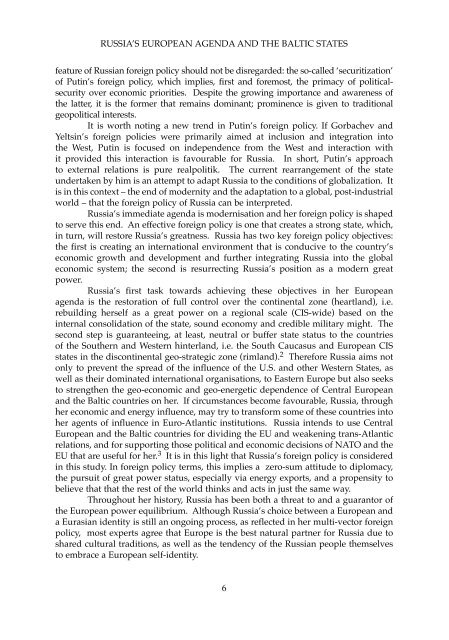Russia's European Agenda and The Baltic States - Defence ...
Russia's European Agenda and The Baltic States - Defence ...
Russia's European Agenda and The Baltic States - Defence ...
Create successful ePaper yourself
Turn your PDF publications into a flip-book with our unique Google optimized e-Paper software.
RUSSIA’S EUROPEAN AGENDA AND THE BALTIC STATES<br />
feature of Russian foreign policy should not be disregarded: the so-called ‘securitization’<br />
of Putin’s foreign policy, which implies, first <strong>and</strong> foremost, the primacy of politicalsecurity<br />
over economic priorities. Despite the growing importance <strong>and</strong> awareness of<br />
the latter, it is the former that remains dominant; prominence is given to traditional<br />
geopolitical interests.<br />
It is worth noting a new trend in Putin’s foreign policy. If Gorbachev <strong>and</strong><br />
Yeltsin’s foreign policies were primarily aimed at inclusion <strong>and</strong> integration into<br />
the West, Putin is focused on independence from the West <strong>and</strong> interaction with<br />
it provided this interaction is favourable for Russia. In short, Putin’s approach<br />
to external relations is pure realpolitik. <strong>The</strong> current rearrangement of the state<br />
undertaken by him is an attempt to adapt Russia to the conditions of globalization. It<br />
is in this context – the end of modernity <strong>and</strong> the adaptation to a global, post-industrial<br />
world – that the foreign policy of Russia can be interpreted.<br />
Russia’s immediate agenda is modernisation <strong>and</strong> her foreign policy is shaped<br />
to serve this end. An effective foreign policy is one that creates a strong state, which,<br />
in turn, will restore Russia’s greatness. Russia has two key foreign policy objectives:<br />
the first is creating an international environment that is conducive to the country’s<br />
economic growth <strong>and</strong> development <strong>and</strong> further integrating Russia into the global<br />
economic system; the second is resurrecting Russia’s position as a modern great<br />
power.<br />
Russia’s first task towards achieving these objectives in her <strong>European</strong><br />
agenda is the restoration of full control over the continental zone (heartl<strong>and</strong>), i.e.<br />
rebuilding herself as a great power on a regional scale (CIS-wide) based on the<br />
internal consolidation of the state, sound economy <strong>and</strong> credible military might. <strong>The</strong><br />
second step is guaranteeing, at least, neutral or buffer state status to the countries<br />
of the Southern <strong>and</strong> Western hinterl<strong>and</strong>, i.e. the South Caucasus <strong>and</strong> <strong>European</strong> CIS<br />
states in the discontinental geo-strategic zone (riml<strong>and</strong>). 2 <strong>The</strong>refore Russia aims not<br />
only to prevent the spread of the influence of the U.S. <strong>and</strong> other Western <strong>States</strong>, as<br />
well as their dominated international organisations, to Eastern Europe but also seeks<br />
to strengthen the geo-economic <strong>and</strong> geo-energetic dependence of Central <strong>European</strong><br />
<strong>and</strong> the <strong>Baltic</strong> countries on her. If circumstances become favourable, Russia, through<br />
her economic <strong>and</strong> energy influence, may try to transform some of these countries into<br />
her agents of influence in Euro-Atlantic institutions. Russia intends to use Central<br />
<strong>European</strong> <strong>and</strong> the <strong>Baltic</strong> countries for dividing the EU <strong>and</strong> weakening trans-Atlantic<br />
relations, <strong>and</strong> for supporting those political <strong>and</strong> economic decisions of NATO <strong>and</strong> the<br />
EU that are useful for her. 3 It is in this light that Russia’s foreign policy is considered<br />
in this study. In foreign policy terms, this implies a zero-sum attitude to diplomacy,<br />
the pursuit of great power status, especially via energy exports, <strong>and</strong> a propensity to<br />
believe that that the rest of the world thinks <strong>and</strong> acts in just the same way.<br />
Throughout her history, Russia has been both a threat to <strong>and</strong> a guarantor of<br />
the <strong>European</strong> power equilibrium. Although Russia’s choice between a <strong>European</strong> <strong>and</strong><br />
a Eurasian identity is still an ongoing process, as reflected in her multi-vector foreign<br />
policy, most experts agree that Europe is the best natural partner for Russia due to<br />
shared cultural traditions, as well as the tendency of the Russian people themselves<br />
to embrace a <strong>European</strong> self-identity.<br />
6

















